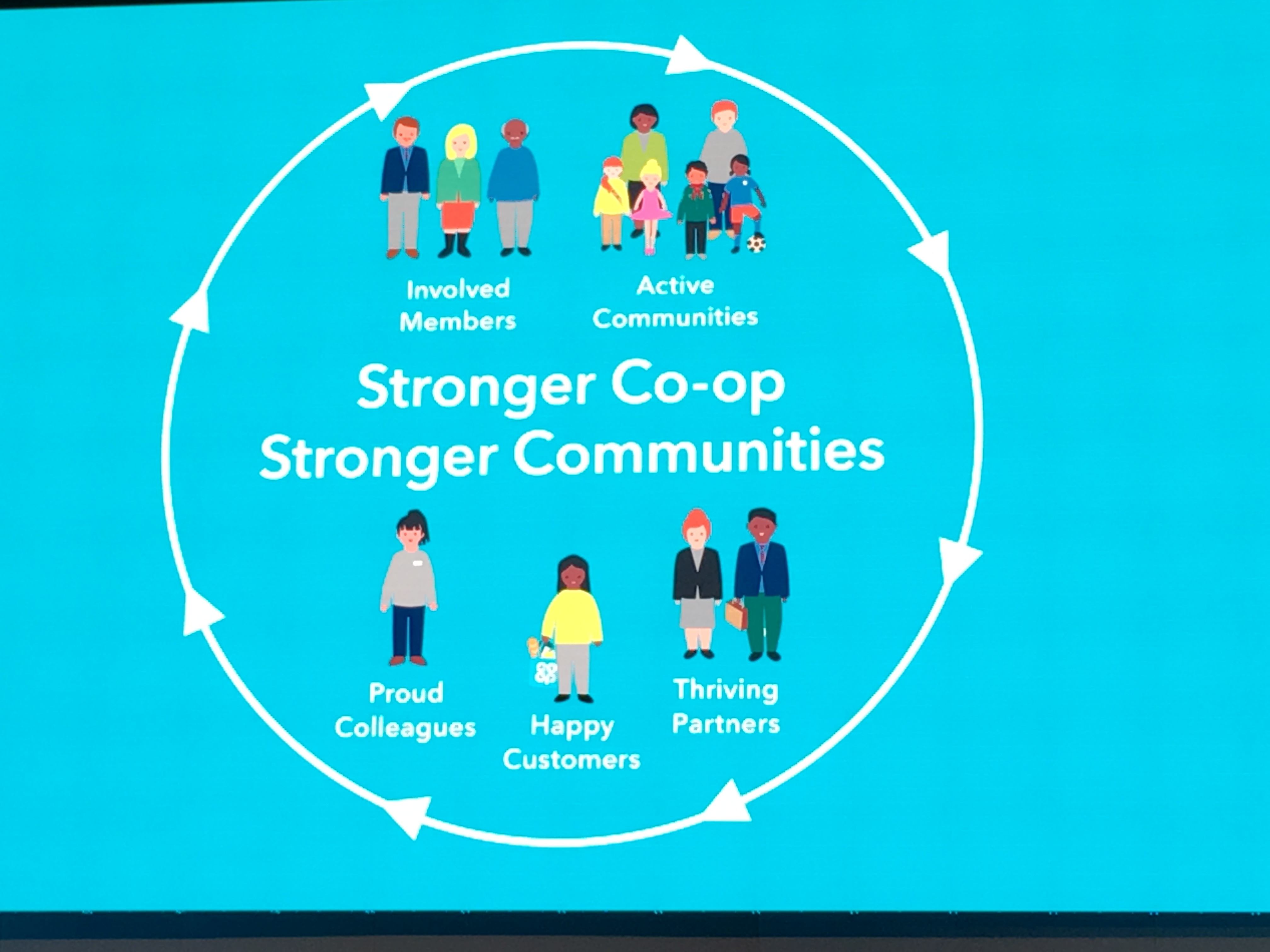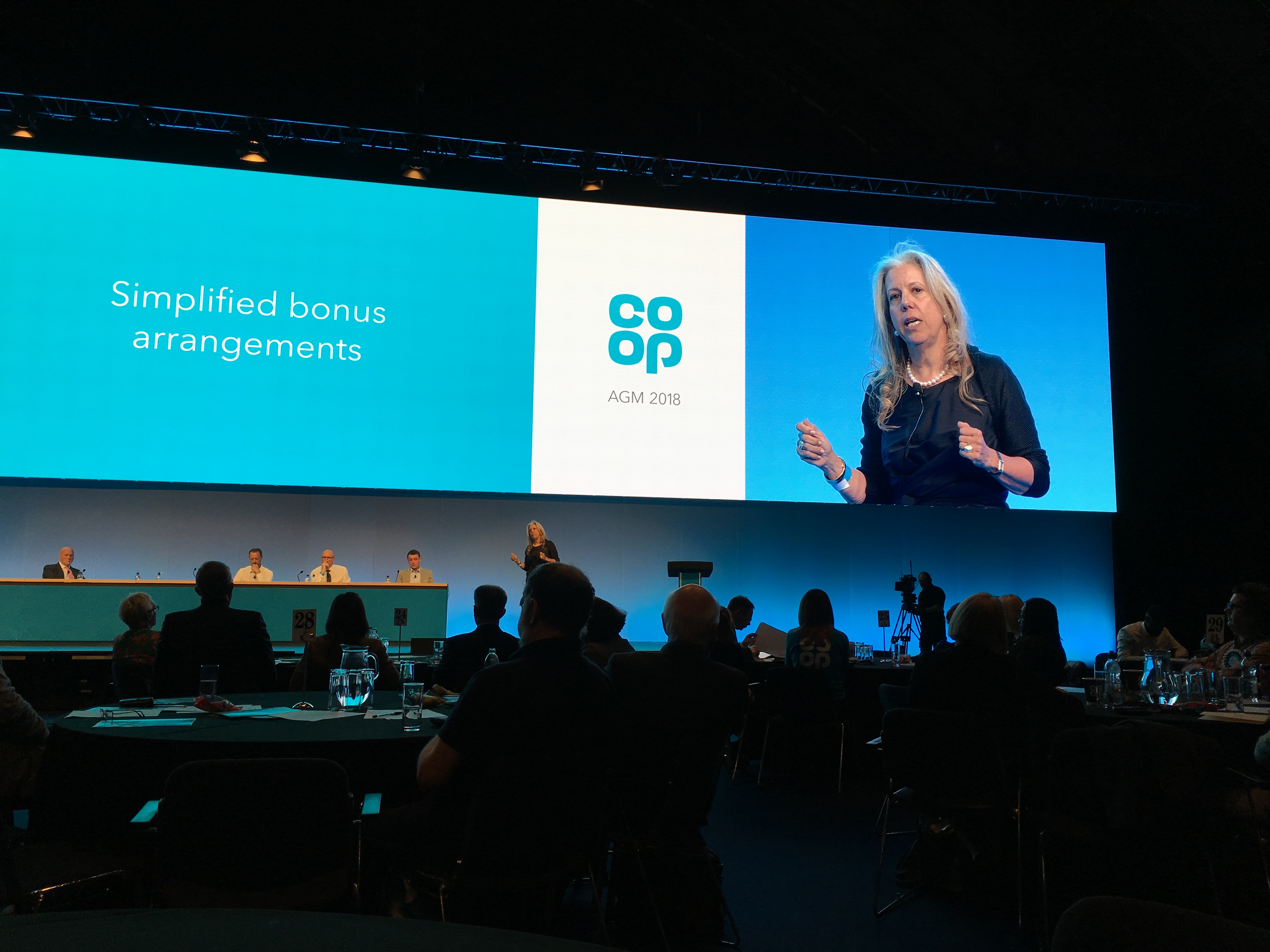The Co-op Group must build on a year which has seen it increase profits and membership by working towards “a stronger Co-op and stronger communities,” its AGM in Manchester was told.
Chair Allan Leighton and chief executive Steve Murrells both hailed a strong performance in 2017 which saw a 15% increase in active members and pre-tax profits grow by 25%, with £100m returned to members through the 5% reward scheme, and £20m go to local causes.
And although the Group was having to deal with problems such as its treatment of suppliers, which has sparked an investigation into suspected violations of the Groceries Code, members also heard how the organisation had made great strides in its campaigning work on issues such as loneliness, modern slavery, plastic waste and Fairtrade.
Related… See how the meeting unfolded here
Mr Murrells said the Group could build on this by using “an old idea we need to make new again: the virtuous co-operative circle”.
A Co-op Group which strengthened the communities it operates in would reap the benefits of that strength, he told delegates. And this would bring crucial advantages at a time when Brexit, an ageing population, a younger generation who are less wealthy than their parents, the breakdown in trust for big organisations and the rise of new forms of digital communication mean “our country is going through a change that is without parallel in my lifetime”.

“The Co-op is well placed to meet these changes because of how we are owned,” he added, calling for a revival of the Rochdale Pioneers’ ethos that came out of the “unsettling change” of the mid 19th century.
“We have to make the most of our co-operative difference because we won’t succeed by being like everyone else.” But Mr Murrells warned that although “we’ve made a lot of progress, we are profitable, we are rewarding communities and members … we’re not seeing the change in shopping habits that we would like.”
To solve that, the Group needed to close “a number of gaps” in the virtuous circle.
This includes extending the reach of Group’s reach into the community – with innovations such as its recently announced no-frills funerals offer, trials of home delivery partnerships, wholesale deals with Costcutter and Nisa, and travel insurance coverage for pre-existing medical conditions.
For customers, the Group was trialling new digital products such as scan-and-go technology, while 21,000 colleagues had taken advantage of a new phone app, Shifts, to organise more flexible working arrangements.
And Mr Murrells said new business ventures were being looked at.
“We’ve not entered new markets since 2006,” he said. “It’s time to look at that.”
These would be online ventures, without the capital outlay for high-street, bricks-and-mortar businesses, and would serve new generations in key areas such as health and wellness, and finance.
The AGM heard how the Group was also working to “close the gap” for colleagues by introducing new colleague awards and setting up networks for BAME workers and young workers, and by offering colleagues health and financial advice.

In terms of pay, Stevie Spring, chair of the remuneration committee, said executive salaries had been frozen and the bonus scheme simplified but frontline staff had seen pay rises of 6% this year and 21.5% over the past three years.
“There’s still lots to be done but we’re making progress,” she said.
Meanwhile the Group was building its apprenticeship scheme, delegates were told, meeting an ambition to have more than 1,000 apprentices at any time and forming part of a “talent pipeline” into the Group from its growing network of Co-op Academy schools.
Related… Co-op AGM voting results
Chief membership officer Matt Atkinson described how the Group had brought the co-op difference to its communities by supporting 8,000 local causes.
“It’s a fantastic example of how our belief in self help, and the way communities can pull together, is of real benefit,” he said.
But, he added, the Group had been assessing these interventions to ensure they were building co-op values and making life more socially rich. This had led it to widen its community fund so it would support other causes alongside regular charities, and to ask how such projects encourage co-operation and “close the gap in reciprocity”.
This widening helped see the number of applications rising from 7,000 to 12,000 last round, with 30% of the fund going to newly eligible groups.
At the same time, said Mr Atkinson, studies of shopping habits found that members who support a local cause also shop more with the Group, spending on average £171 more.
Alongside efforts to grow the Group’s member pioneer network and to use online platforms to increase community participation, this was giving the business the opportunity to further close the gap in the virtuous circle and “build a clear and unashamed bias towards creating genuine co-operation,” he added.
Related… 2018 Members’ Council Elections
Mr Murrells stressed that the Group needed to be careful about how these efforts were funded, by looking at the cost of running the society, with organisational changes – “having the right people in the right jobs doing the right things” – getting “better deals on things we buy” and setting up a new service centre to look after back office functions.
He said the Group was aiming to find more than £100m to help fund that growth.
“Two years ago went back to being the Co-op,” he said. “A year ago we went back to being a campaigning co-op. This year we returned to commercial success.”

